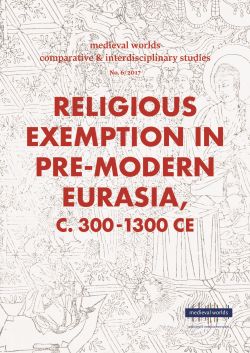Walter POHL – Andre GINGRICH (Eds.)
medieval worlds • no. 6 • 2017
Religious Exemption in Pre-Modern Eurasia, C. 300-1300 CE
Rutger Kramer
S. 231 - 261
doi:
10.1553/medievalworlds_no6_2017s231
Verlag der Österreichischen Akademie der Wissenschaften
Abstract:
When the two Carolingian intellectuals Alcuin of Tours and Theodulf of Orleans engaged in a dispute over the fate of a criminal who had sought asylum in the church of Saint Martin in Tours, their conflict quickly turned into a heated political debate that reached the highest level of the Frankish Empire. As evidenced by the letters written during this altercation, this seemingly simple matter of church asylum brought up intractable questions of who should arbitrate on matters such as these, what it would mean if bishops interfered in church matters outside their own diocese, and how this matter affected the essential unity of the Carolingian church. From appeals to personal responsibility to the institutionalisation of the Empire, the debate between Alcuin, Theodulf and Charlemagne was ultimately about everybody’s place in the greater scheme of things, and the question of who should play by the rules, and who would be exempt.
Carolingian empire; Charlemagne; Alcuin; Theodulf of Orléans; church asylum; conflict resolution; letters; politics and religion; imperium; ecclesia
Published Online:
2017/12/01 11:47:40
Object Identifier:
0xc1aa5576 0x00372f2b
Rights:All rights reserved.For questions regarding copyright and copies please contact us by email.
MEDIEVAL WORLDS provides a new forum for interdisciplinary and transcultural studies of the Middle Ages. Specifically it encourages and links comparative research between different regions and fields and promotes methodological innovation in transdisciplinary studies. Focusing on the Middle Ages (c. 400-1500 CE, but can be extended whenever thematically fruitful or appropriate), MEDIEVAL WORLDS takes a global approach to studying history in a comparative setting.
MEDIEVAL WORLDS is open to regular submissions on comparative topics, but also offers the possibility to propose or advertise subjects that lend themselves to comparison. With a view to connecting people working on related topics in different academic environments, we publish calls for matching articles and for contributions on particular issues.
Table of Contents
Religious Exemption in Pre-Modern Eurasia, c. 300 – 1300 CE: Introduction
Charles West
Treasures in Heaven: Defining the Eurasian Old Regime?
R. I. Moore
Envisioning a No-Man’s Land: Hermitage as a Site of Exemption in Ancient and Early Medieval
Indian Literature
Kanad Sinha
Evolving Relationship between the Buddhist Monastic Order and the Imperial States of Medieval
China
Mario Poceski
The Normative Character of Monastic Exemption in the Early Medieval Latin West
Kriston R. Rennie
Clerical Exemption in Canon Law from Gratian to the Decretals
Anne J. Duggan
Nothing to Declare: Status, Power and Religious Aspiration in the Policies of Taxation in Ancient
India
Ulrich Pagel
Exemption Not Granted: The Confrontation between Buddhism and the Chinese State in Late
Antiquity and the ‘First Great Divergence’ Between China and Western Eurasia
Antonello Palumbo
The Political Significance of Gifts of Power in the Khmer and Mercian Kingdoms 793-926
Dominic Goodall and Andrew Wareham
Conversion, Exemption, and Manipulation: Social Benefits and Conversion to Islam in Late Antiquity
and the Middle Ages
Uriel Simonsohn
Religious Exemption, Justice, and Territories around the Year 1000: The Forgeries of Worms
Thomas Kohl
The Exemption that Proves the Rule: Autonomy and Authority between Alcuin, Theodulf and
Charlemagne (802)
Rutger Kramer
From Symbiosis to Separate Spheres? England, 1163
Judith A. Green
Religious Exemption and Global History before 1300 – Closing Comments
Julia McClure




 Home
Home Print
Print
 References
References
 Share
Share
